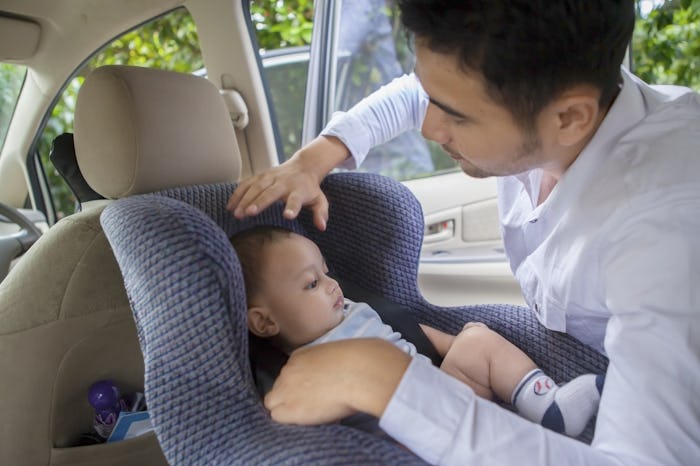Life

6 Ways You May Be Causing Your Baby’s Carsickness
Road trips with a baby are always an adventure. Whether your child is one of the few who actually enjoy their carseat or is a member of the majority who loath it's existence, sometimes road trips are unavoidable and you just have to make the best of it. If your baby seems to be particularly grumpy in the car and you've done everything to make them happen, it's possible that they suffer from carsickness. And, as it turns out, there are several ways you may be causing baby's carsickness without even realizing it. Since babies aren't able to vocalize how they feel, it can be hard to figure it out.
According to the Mayo Clinic, car sickness is most common in kids ages 2 to 7, although it can technically happen at any age. Excessive fussiness, cold sweats, and nausea are the most common symptoms of carsickness, but knowing how to soothe your dizzy kiddo can be easier said than done.
Obviously, the quickest way to stop the motion sickness is to stop driving, but when that isn't possible, there are a few things you can do to make sure you're not making the problem worse without knowing it. A sick baby, whether they love the car or not, is every road trips worst nightmare, so avoiding car sickness at all costs is in everyone's best interest.
1You Keep The Windows Shut
According to the Dr. Sears website, getting some fresh air in the car can be one of the quickest ways to relieve your child's car sickness. It could be a window in the front seat, or the one closest to your child. The fresh air will eliminate any odors that may be adding to the sickness as well, like food or other smells.
2You Brake Too Hard
3You Don't Take Enough Stops
Long road trips can be tedious for everyone involved and it's tempting to push through until you're at your destination, but Baby Center noted that, regardless of your child's age, car sickness can happen from simply being in the car for too long. Schedule your stops ahead of time and try to take a break every few hours to stretch your legs and get some fresh air.
4You Keep Them Rear Facing Too Long
Since babies have to be in rear facing carseats, carsickness can be harder to avoid. However, once they've aged out of their carseat, be sure to switch them forward, particularly if they struggle with dizziness in the car. Parents noted that if your child is at least 1 year old and weighs at least 20 pounds, they've reached the weight limit on their carseat, or they appear crowded by their seat, it's probably time to switch them to a new seat.
5You Give Them Too Many Distractions
It's equally tempting to keep your child distracted with books, electronics, toys, or games during your drives, but Healthy Children noted that distractions can sometimes exacerbate the problem. Encourage your kiddo to look out the front window instead.
6You Forget The Snacks
The aforementioned Dr. Sears website article also noted that an empty stomach is the prime recipe for car sickness, so bringing along a few snacks to keep baby's stomach full and happy like crackers or fruit is a good idea.